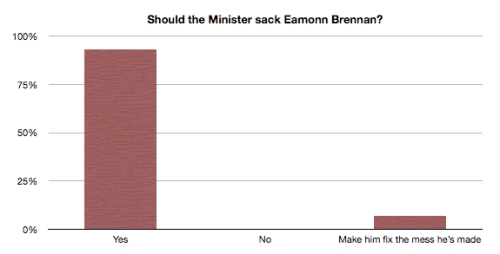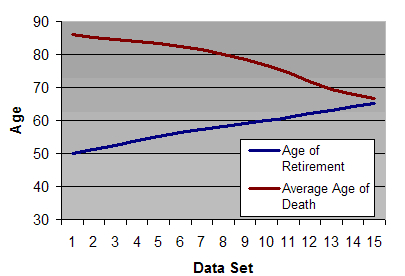http://www.iaa.ie/index.jsp?p=93&n=96&a=829
19 January 2010: The Irish Aviation Authority, (IAA) had no alternative today (Tuesday 19th January 2010) but to suspend Air Traffic Control Officers (ATCOs) who refuse to carry out normal assigned duties until their demands have been met.
You had the choice of not suspending the controllers and thus avoiding the dispute in full.
Since 1st January the ATCOs union, IMPACT has instructed controllers not to co-operate with a number of new technology projects unless the Authority commits to payment for these changes. However, the real agenda is:
Forcing the immediate payment of a 6% pay increase agreed as part of the last partnership agreement – Towards 2016;
No, this is not the “real agenda”. The T16 pay increases have been independently assessed and the recommendation has been the IAA can afford the increase without any need to pass this on to the airline industry. But this is not the real issue of the dispute, this issue has been ongoing for 18 months; it is complete bollix to link T16 pay increase to this dispute – there are facts and there’s spin!
Avoiding the payment of a contribution towards their pensions in line with all other public sector staff. ATCOs pay no pension contribution and the Authority pays a contribution of 30.5% of salary.
Nobody has said no to talking about making contributions to our pensions. This again is pure spin. The facts remain that illegal unilateral change will be implemented without any consultation with staff or unions. The presentation was a briefing and there have been no concessions given and not one staff member has any ability to talk to any board member or manager without a prospect of being told “that is how it is”. A contribution is only one of the changes. Two other significant elements not even discussed are the increase in retirement age and the capping on pension rises in the future at CPI or 3% which ever is the lower; potentially a significant financial penalty without any justification or direct cost savings to the employer. You also announced that no employee will be entitled to a salary increment for 2 years.
Flights at all airports are likely to be disrupted by this dispute. The IAA apologies to all members of the travelling public and to the airlines for the disruption that this action by ATCOs will cause. Passengers are advised to contact their airline before setting out.
The IAA can reverse its decision to suspend 15 controllers and return business to normal.
Pay Increase of 6%
The first issue, an increase of 6%: An increase of 6% to would cost the IAA an additional € 6 million each year. This cost would have to be passed to the airlines who fund the IAA – the Authority receives no State funding. The airlines cannot afford to pay.
This is a lie; the independent assessment has determined that the IAA can easily afford to pay the 6%, but this is not the real dispute and you know it.
“The aviation industry is on its knees at the moment,” says Liam Kavanagh, Director of Human Resources, IAA. “The ailing airlines, including Aer Lingus, Cityjet, Aer Arann – cannot afford to take on additional costs. Meeting the 6% pay demand to 300 Air Traffic Controllers would cost an additional € 6 million per year. This would have to be passed on in its entirety to the airlines since we in the IAA receive no funding from Government.”
Is 6% really €20,000 each? ie €6M divided by 300; wow didn’t realise that we averaged out at €335K each (including on costs) think I might need to check my pay-slip. The total cost to pay controllers 6% is by my calculations €2.1M, this includes all on costs. There is a massive gap between €6M and €2.1M. Who is spinning this? How much will a 4 hour stoppage cost the industry? More than the true total annual cost?
The ATCOs play a vital role in the safety of air transport and are currently highly paid, according to the IAA. No pay cuts are proposed. No job losses are envisaged in 2010.
Because you have overseas contractors here to fill holes in your rosters that your poor HR planners missed. The IAA is short of permanent ATCs there would be no way jobs could be cut without service reductions.
“ATCOs are significantly well paid compared to other public sector workers such as teachers, guards and nurses, all of whom also do essential work,” says Liam Kavanagh.
So? Nobody is saying otherwise. How does an Irish ATC compare on a global scale? What about within Europe? Would it be true that Irish ATC’s are among the lowest paid in Europe?
“The salary for an ATCO is approximately €115K. If you factor in the pension contribution and the PRSI contribution that the IAA makes for each person, their total package comes to almost €160K. They do vital work and they are very well paid for that work. This is the wrong time to be looking for a pay increase of 6%. We have told the ATCOs we will be happy to review this in 2012.”
But wait you just said above that 6% x 300 would cost €6M per annum. €160K x 6% x 300 is only €2.88M; well which is it? This also assumes everyone is on the top salary, which is clearly not the case, some controllers who rated recently are on closer to €55K.
There is no recognition that the IAA is now profitable (despite only being a cost recovery organisation) in its worst year since 2007, what will the 2010 profit be, what about 2011?
Pension Contribution
The second issue, pension contribution: The IAA provides a defined benefits scheme for ATCOs.
“A defined benefits scheme is a Rolls Royce pension, and not many people are lucky enough to have such a pension,” says Liam Kavanagh. “ATCOs make no contribution to their pension. The Authority, meanwhile, makes a contribution of 30.5% of salary for each person. We are asking them to make a contribution, in line with all of their colleagues in the public sector who now pay a pension levy. They do not want to make a contribution to their own pensions.
See above, nobody has said no to talks except the IAA; not all employees are on this “Rolls Royce” pension plan. The main points are stated above:
- Increased retirement age; without negotiation.
- Reduced pension earnings; without negotiation.
- No salary increments; without negotiation.
- Forced contribution; without negotiation.
The IAA is asking ATCOs to make this contribution in line with all other public sector staff, and because the pension fund is in deficit to a total of €234 million.
Why is deficit so large, what mistakes have management made with this fund? Has it been funded correctly in the past? Has the IAA redistributed funds to profits and capex rather than pension funds?
Need for Ongoing Change
Ongoing change is a necessity in the dynamic aviation industry.
“We need to constantly review and update our systems,” says Liam Kavanagh. “And we cannot afford to make a payment to people every time we upgrade a system. We are not talking revolutionary change – sometimes the change can be the equivalent of upgrading from Microsoft XP to Microsoft Vista. That level of ongoing change is vital to ensure that we are being effective.”
You initiated unilateral changes without negotiation, why would you not expect a fight? Controllers do little else than manage changes, formal withdrawal from the projects was a direct response to unilateral non negotiated changes imposed by the IAA, effective 1 Feb 2010.
We would ask IMPACT to desist from this action and to return to normal work. We can resolve all of these issues without having an impact on airlines and on the travelling public.
We would ask the employer to back off and come to the negotiating table without a naked flame to our pensions and pay packets and honestly lay the numbers on the table to discuss openly, without the need for media spin. We want them to talk to us directly not lie at us through the media.

